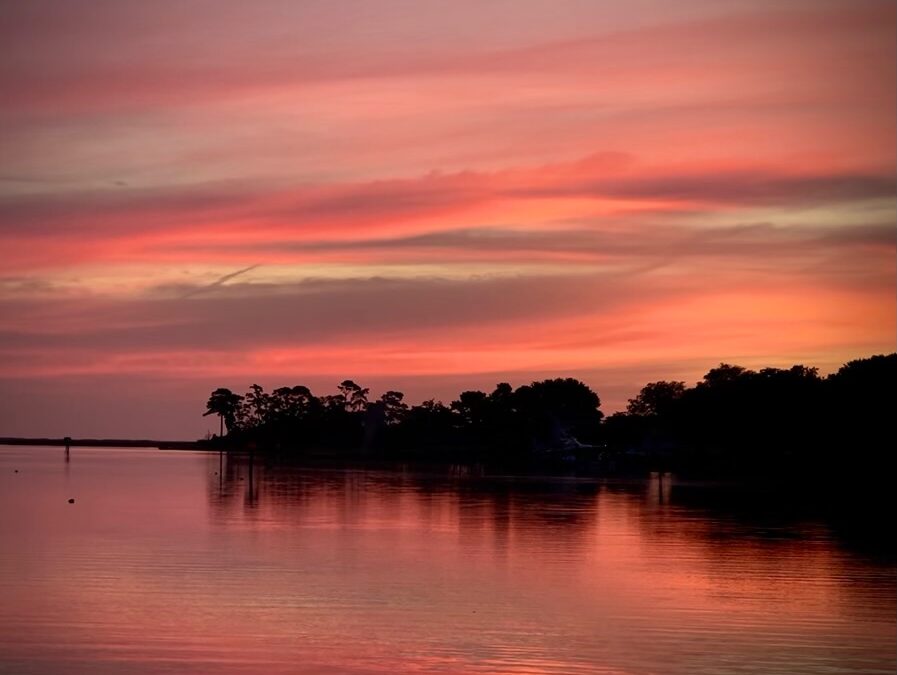Boating offers some of the most picturesque views during the day, but there’s something truly magical about heading out on the water after the sun sets. Whether it’s the serenity of the night, the peaceful reflection of the moon on the water, or the thrill of evening fishing, boating at night can be an unforgettable experience. However, night boating presents unique challenges and risks that require additional caution and preparation.
Navigating through the waters at night, particularly around busy waterways like the Chesapeake Bay or near Poquoson, VA, requires boaters to be extra vigilant. With reduced visibility, the chances of accidents or running aground increase, and the risk of collisions with other boats or obstacles is heightened. In this post, we’ll discuss the essential safety tips for night boating, helping you prepare for a safe, enjoyable adventure under the stars.
1. Ensure Your Boat is Well-Equipped for Night Boating
Before venturing out, make sure your boat is properly equipped for safe navigation in low-light conditions. Night boating often requires additional equipment that ensures you can see and be seen by others, as well as handle any emergency situations.
Start by checking that all navigation lights are working. At night, these lights are crucial for marking your boat’s position and direction of travel. According to U.S. Coast Guard regulations, you must have a white stern light visible from 2 miles, and a red and green navigation light visible from at least one mile when you’re underway.
In addition to lights, ensure that your boat has functional sound signaling devices, such as a horn or whistle. In the event of an emergency, you’ll need a way to alert nearby vessels. You should also make sure you have a flashlight or headlamp on board, as it will be vital for signaling or checking equipment in the dark. It’s also a good idea to bring extra batteries for all lights and signaling devices.
Tip: Check your boat’s lights and emergency equipment before every trip. A quick inspection could save you in an emergency situation.
2. Familiarize Yourself with the Waters and Obstacles
One of the most challenging aspects of night boating is the inability to see underwater hazards, floating debris, or other vessels. For this reason, it’s important to be familiar with the waterway you plan to navigate, whether you’re boating on the Chesapeake Bay or in a local area near Poquoson, VA.
When boating at night, try to stick to familiar routes. If you’re exploring a new area, do so during daylight hours first to familiarize yourself with any potential hazards like rocks, sandbars, and floating debris. When cruising at night, always maintain a slower speed than you would during the day. Reduce your speed to a level where you can react quickly to any sudden obstacles or changes in conditions. Even with proper lights and equipment, you may not have enough time to react to hazards in the dark if you’re traveling too fast.
Tip: Make a map of safe routes during daylight, and plan accordingly for your night adventures. Always know where potential hazards may be located in the water.
3. Stay Aware of Other Boats and Maritime Traffic
At night, the risk of collisions with other boats increases significantly. Without the visual reference of daytime, boats can easily drift into each other’s paths. If you’re boating in areas with heavy maritime traffic, such as around Norfolk, VA, or Poquoson, VA, it’s essential to keep an eye out for other vessels and to follow the proper navigation rules.
Keep in mind that vessels operating in the dark may not always display their full set of navigation lights. This can make it difficult to determine their direction or intentions. To stay safe, always maintain a safe distance from other boats and communicate your movements with horn signals if necessary.
One helpful tip for staying visible to other boaters is to use your navigation lights correctly. Never dim or turn off your lights while underway. These lights allow other vessels to see your boat from a distance and avoid collisions. If you’re anchoring for the night, make sure you have an anchor light on, which is a white light that is visible from all directions.
Tip: Keep a safe distance from other vessels, and use your horn or whistle to communicate your intentions when necessary. Stay visible at all times with your navigation lights.
4. Be Prepared for Emergencies
Just like with daytime boating, having a well-stocked emergency kit is essential when boating at night. But at night, it’s even more crucial to be prepared for emergencies because the limited visibility can make it harder to assess and react to emergencies quickly.
Before heading out, ensure your emergency supplies are up to date and easy to access. This includes life jackets, a first-aid kit, a fire extinguisher, and distress signals such as flares or an emergency position-indicating radio beacon (EPIRB). A well-equipped first-aid kit is especially important in the event of an accident, as night boating increases the chance of mishaps due to reduced visibility.
You should also review emergency procedures with your passengers before leaving the dock. Make sure everyone knows where safety equipment is stored, how to use it, and the steps to take in case of an emergency. It’s essential that everyone is prepared, even if it’s only a short night outing.
Tip: Conduct an emergency drill with your passengers to make sure everyone knows the safety procedures, especially before setting out on a longer trip.
5. Stay Alert and Avoid Distractions
Night boating can be more physically demanding than boating during the day. The darkness, along with the reduced visibility, requires heightened awareness at all times. It’s important to stay alert and avoid distractions, as one moment of inattention can lead to dangerous situations.
Avoid using your phone while navigating at night. Instead, focus all your attention on your surroundings and the condition of your boat. Stay in contact with fellow boaters if you’re traveling in a group, and maintain regular communication about your positions and any changes in plans.
If you’re operating a boat at night for the first time, consider going out with an experienced boater who knows the area and can help guide you through tricky situations. As a beginner, having someone with experience on board can significantly reduce the risk of accidents and help you feel more comfortable navigating at night.
Tip: Make it a rule to limit distractions while navigating at night. Staying focused on the water and your surroundings is key to a safe boating experience.
6. Know the Local Navigation Rules and Regulations
Navigating at night on the Chesapeake Bay or in Poquoson, VA, requires a good understanding of local rules and regulations. Most boating areas, especially near busy spots like Norfolk, VA, have specific rules to follow regarding speed limits, right-of-way, and signaling at night. Be sure you know these rules before heading out and adhere to them to prevent accidents.
Additionally, check if any special nighttime regulations apply to the area you plan to boat in, such as no-wake zones or restrictions on anchoring overnight. Adhering to these regulations helps ensure that you are boating safely while minimizing the risk of accidents.
Tip: Review local boating laws and regulations before your night outing to ensure that you’re in compliance with all required safety and operational rules.
7. Consider Your Passengers Comfort and Safety
While staying safe on the water is important, the comfort of your passengers plays a big role in creating a positive experience. Be sure to have enough space for everyone on board and make arrangements for a comfortable boating adventure, especially if you’re planning a long night on the water. Be sure your boat is equipped with enough seating, life jackets for each person, and other necessary items.
Also, be prepared for the colder temperatures that may come with boating at night, even in warmer months. Bring along warm clothing and blankets for yourself and your passengers, and consider keeping the boat’s cabin or areas sheltered to provide a comfortable retreat from the elements.
Tip: Ensure your passengers are as comfortable as possible, especially if you’re out on the water for extended hours. Keeping everyone safe and comfortable enhances the overall boating experience.
8. Submit Your Float Plan with Someone on Land
One of the most important safety precautions when boating at night, or anytime, is having a float plan. A float plan is a written document that details your boating itinerary, emergency contacts, and planned route. It’s a simple yet crucial tool that can help search and rescue teams locate you in case of an emergency.
Before you head out on your night boating trip, always submit your float plan to someone on land. This person should be someone you trust—such as a friend or family member—who is not on the boat with you. The plan should include information such as the names of everyone on board, the boat’s make and model, your departure time, your destination, and your expected return time. It’s also important to list any alternate routes or stops you may make during your trip.
Having a float plan filed with someone who is on land allows for a quick response if something goes wrong. In case of an emergency, authorities will have all the necessary information to start a search for your boat. This safety measure adds an extra layer of security and ensures that help can reach you as quickly as possible.
Tip: Keep your float plan simple and easy to read. Share it with the person on land and make sure they know when to call for help if you don’t return within the expected timeframe.
That’s a Wrap on Navigating the Night!
Night boating on the Chesapeake Bay or in areas like Poquoson, VA, offers a unique and peaceful experience, but it requires extra care and preparation to ensure safety. By following the essential safety tips outlined here—from checking equipment to staying aware of your surroundings—you’ll be well-equipped for a fun and safe adventure under the stars.
Whether you’re navigating the calm waters of the Chesapeake Bay, fishing under the moonlight, or enjoying a peaceful evening cruise, remember that safety always comes first. If you’re looking for a marina to dock your boat this season, Whitehouse Cove Marina offers secure boat slip rentals with easy access to the best boating spots on the Chesapeake Bay. Contact us today to secure your spot and get ready for a season of unforgettable boating experiences!

